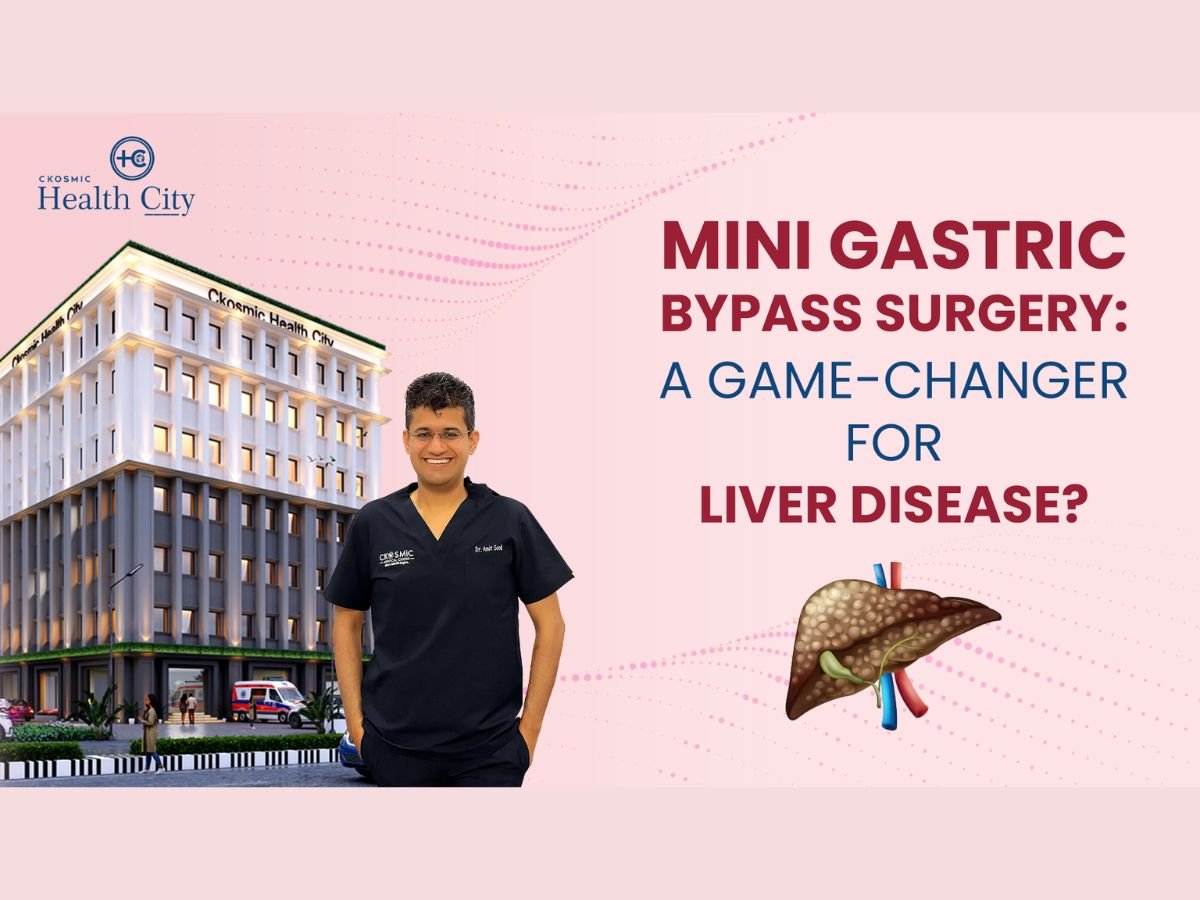
Mini Gastric Bypass Surgery: A Game-Changer for Liver Disease?
New Delhi (India) July 23 : In recent years, mini gastric bypass (MGB) surgery has become popular not only for how well it achieves weight loss but also for what it can do for treating liver disease. As the prevalence of obesity continues to rise, understanding the multifaceted role of MGB in managing excess weight, and health complications like liver disease, that accompany it, becomes increasingly necessary.
Let’s look at the innovative aspects of mini gastric bypass surgery, and its impact on liver disease. Let’s begin.
Unveiling the Connection: Obesity and Liver Disease
How Excess Weight Affects Liver Health
Obesity is a significant risk factor for a range of liver diseases, most notably non-alcoholic fatty liver disease (NAFLD). NAFLD encompasses a spectrum of liver conditions, from simple steatosis (fatty liver) to non-alcoholic steatohepatitis (NASH), that can grow into fibrosis, cirrhosis, and even hepatocellular carcinoma (liver cancer). The pathophysiology of NAFLD is complex, involving insulin resistance, oxidative stress, and chronic inflammation.
Insulin Resistance: The Silent Culprit
Insulin resistance is one of the main causes behind the development of NAFLD. By promoting lipolysis (breakdown of fats) in adipose tissue, it leads to increased free fatty acids in the liver. This development can result in hepatic steatosis, triggering inflammatory pathways, and contributing to liver damage and fibrosis.
Weight loss through dietary change and physical activity can improve insulin sensitivity, but significant and sustained weight reduction is often challenging to achieve and maintain.
The Mechanisms Behind Mini Gastric Bypass Surgery
Beyond Caloric Restriction: Hormonal Changes
Mini gastric bypass in Punjab can create many metabolic changes beyond simply restricting calories, one of the key changes being the alteration in gut hormones. After the mini gastric bypass, there is an increase in hormones such as glucagon-like peptide-1 (GLP-1) and peptide YY (PYY), which enhance insulin secretion, reduce appetite, and improve glucose homeostasis. These hormonal shifts are beneficial for both weight loss and liver health.
The Microbiome Factor
Emerging research reveals that the gut microbiome plays a critical role in the pathogenesis of NAFLD. Obesity is associated with dysbiosis, an imbalance in the gut microbiota, which can contribute to liver inflammation and insulin resistance. Mini gastric bypass surgery has been shown to positively influence the gut microbiome, promoting a more favourable composition that supports metabolic health and reduces liver fat accumulation.
MGB and Liver Disease: Clinical Evidence
Long-Term Studies and Outcomes
Several long-term studies have demonstrated that MGB leads to substantial and sustained weight loss, which is crucial for managing NAFLD and NASH. In addition to weight loss, the surgery has been associated with significant reductions in liver enzymes (ALT and AST), indicative of decreased liver inflammation. Furthermore, improvements in liver histology, including reductions in steatosis, inflammation, and fibrosis, have been documented.
Personalized Approach to Bariatric Surgery at CKOSMIC Health City
Comprehensive Preoperative EvaluationC
At CKOSMIC Health City, Dr Amit Sood has treated numerous patients with obesity-related liver disease, offering a comprehensive approach to bariatric surgery. Each patient undergoes a thorough preoperative evaluation, including liver function tests, imaging studies, and assessment of metabolic health. This ensures that the chosen surgical approach is tailored to the individual’s specific needs and health status.
Postoperative Care and Long-Term Monitoring
Postoperative care is crucial for the success of MGB in managing liver disease. Dr Amit Sood and his team provide extensive follow-up care, including dietary counselling, monitoring of liver function, and support for lifestyle modifications. Dr Amit Sood ensures that patients receive continuous care to sustain weight loss and liver health improvements.
Addressing Concerns: MGB Personalization
Patient Selection Criteria
While MGB offers numerous benefits, it is not suitable for everyone. Ideal candidates are those with a BMI over 30 with obesity-related health conditions or a BMI over 32. Patients with advanced liver disease require careful evaluation to determine the safety and efficacy of MGB. Dr. Amit Sood emphasizes the importance of individualized care, ensuring that each patient’s unique circumstances are considered.
Potential Risks and Complications
Like any surgical procedure, MGB carries potential risks and complications. These can include nutritional deficiencies, gastrointestinal symptoms, and surgical complications. However, with expert surgical techniques and comprehensive postoperative care, these risks can be minimized. CKOSMIC Health City’s track record of successful outcomes speaks to its commitment to patient safety and excellence in bariatric care.
Conclusion
Mini gastric bypass surgery represents a promising intervention for individuals struggling with obesity and liver disease. By addressing the underlying metabolic disturbances, MGB offers a pathway to improved liver health and overall well-being. CKOSMIC Health City, led by Dr Amit Sood, is at the forefront of this transformative approach, providing expert care and innovative solutions for patients. If you are battling obesity and liver disease, you can consult the best bariatric surgeon in Punjab at CKOSMIC Health City to explore how mini gastric bypass in Punjab can change your life.
If you have any objection to this press release content, kindly contact pr.error.rectification@gmail.com to notify us. We will respond and rectify the situation in the next 24 hours.
